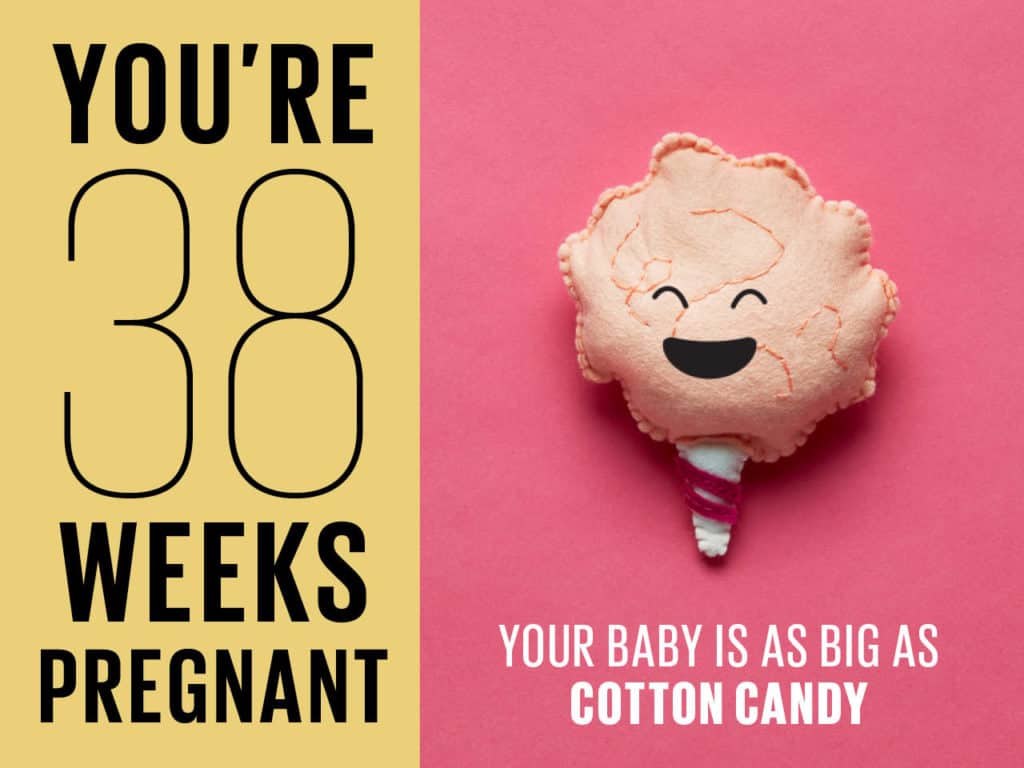
Table of Contents
In the 38 Weeks Pregnant, while your anxiety and anticipation peaks, the baby is now ready to talk as their vocal cords would now be fully developed! An average baby in the 38th week would measure about 19.6 inches long and weigh 6.8 pounds. To put things in perspective, this would be right about the size of a bowling pin!
38 Weeks Pregnant: So What Else Is Happening To Your Baby?
Since you are almost nearing your term, most of the baby’s organs develop to their best by the 38th week. Having said that, the baby’s brains and lungs, though, would still continue to grow as these two organs anyway continue to develop in childhood and adulthood.
Here’s what else is happening to your baby in the 38th week of pregnancy-
- The vocal cords fully develop Yup, the baby is now fully ready to communicate and to cry!
- The baby, by this time, would also have that big baby head, almost about the same circumference as their abdomen!
- Your baby’s fingernails and toenails have completely developed – toenails have grown to the tips of your baby’s toes, and their fingernails might even extend beyond their fingertips. Be prepared to give your baby a nail trim shortly after birth, so make sure you have those baby nail clippers on hand!
38 Weeks Pregnant Symptoms Not To Ignore:
Since the delivery is now approaching, you might be experiencing a lot of emotional and physical turmoil. These are commonly felt emotions and worry you not, you are never alone mamma! Here are the 38 weeks pregnant symptoms not to ignore–
1. Mild swelling
While mild swelling in your body parts like hands and feet is common at the 38th week of pregnancy, unannounced severe swelling is not. Do remember: sudden swelling in hands, feet, ankles, or on the face, could point to the possibility of you having preeclampsia. Reach out to your doctor immediately.
2. Contractions
One of the most welcomed symptoms of childbirth! Braxton Hicks contractions aka fake contractions or mild tightening or cramping across your pregnant belly are common at this time.
3. Back pain
Blame it on all that swaddling! A painful, sore back is common due to the change of posture and the extra weight of the baby in the 38th week. Immense or piercing back pain could also point to a possible approaching labor!
4. Stress
Anxiety about the unknown is common as well as obvious in pregnancy and postpartum. Take some time to ponder and to educate yourself about what could happen, find a friend to talk to, cuddle your partner, and just relax for the rest- it’s gonna be fine!
5. Nausea
Since the baby starts to crowd the digestive system after dropping, nausea and other tummy problems are common.
6. Vaginal discharge
Your mucus plug might fall out in the 38th week as the cervix starts to dilate. You might also experience a very watery discharge which would be your amniotic fluid. Hence, keep a close eye on your discharges and contact your doctor if you have a reason to believe your discharge is unusual.
7. Insomnia
Pregnancy often brings sleep challenges. To sleep better, practice good sleep hygiene: avoid large meals and too much fluid before bed, create a calm environment, and stay away from screens an hour before sleep. If you can’t sleep after 30 minutes, move to another room and relax. While late pregnancy insomnia is usually harmless, if it affects your daily life, consult your healthcare provider.
8. Crazy Dreams
During pregnancy, you might experience vivid dreams, which can range from scary to joyful or even erotic. Hormone surges are believed to intensify these dreams. Sometimes, they reflect your conscious thoughts and worries, such as anxiety about labor and parenthood, particularly in late pregnancy. Other times, these dreams are unrelated to reality. So, don’t feel guilty if you wake up from an intense dream.
9. Heartburn
At 38 weeks pregnant, heartburn can be particularly troublesome due to your expanding abdomen. To manage it, eat smaller meals, especially if heartburn is a concern. Elevating your chest when sleeping can help, as gravity aids digestion. Avoid trigger foods, even if tempting.
Nausea, along with symptoms like gas and heartburn, can also occur at this stage. If you experience sudden nausea or vomiting, contact your healthcare provider, as it could indicate preeclampsia.
10. Lightning Crotch
At 38 weeks pregnant, you might encounter an abrupt, sharp pelvic or groin pain known as “lightning crotch.” Though it sounds alarming, it’s generally harmless and brief.
This pain feels like a sudden electric shock and typically lasts only a few seconds. It occurs when your baby’s head presses against the nerves in your cervix and lower uterus, most commonly in late third trimester when your baby descends lower into your pelvis. Using a supportive belly band can potentially prevent lightning crotch. When it strikes, changing your position can help alleviate it.
38 Weeks Pregnant: What Do Hospitals Test Newborns For Before Leaving The Hospital?
Now that you are nearing delivery, as some good to know information, there would be some tests recommended by your doctor before you leave the hospital. In most normal cases, these tests would include a blood test, a hearing test, and a screening test for the detection of potential congenital heart defects. All of these, needless to say, is just to determine the overall health of the baby.
Also, in case you’re having a boy and you want to have him circumcised, this will also be recommended by your doctor before you leave the hospital.
38 Weeks Pregnant Checklist
Be Aware of Late-Pregnancy Complication
Stay vigilant for potential late pregnancy complications and contact your healthcare provider if you notice concerning symptoms.
Prepare Your Home
Ensure your home is clean and welcoming for your new baby’s arrival. Discover valuable insights from other parents on preparing for a newborn.
Explore Baby Feeding
Consider your baby’s feeding method. If you choose to breastfeed, seek advice from experienced moms. If you opt for formula feeding, that’s perfectly fine too. Being knowledgeable about both approaches is useful, as flexibility is key in feeding your baby. Remember, a healthy, fed baby and a happy, healthy mom are the ultimate goals..
Understand Newborn Screening
Familiarize yourself with newborn screening tests, which are essential to detect rare but serious conditions like hearing loss, congenital heart defects, and metabolic disorders. Timely diagnosis and treatment are crucial for a baby’s long-term health and well-being.
38 Weeks Pregnant: What Does A 38-Week Pregnant Belly Look Like?
By the 38th week, you would have gained your total possible pregnancy weight and so, your belly would be in its full force! Your doctor, by this time, will start taking closer and more frequent examinations of the belly just to make sure everything is going well inside there. Having said that it also becomes your responsibility to make sure that you reach out to your doctor if you feel anything even slightly unusual with regards to your baby’s movement and being.
Final Takeaway
Brace yourself, mamma, it is about time! You might be feeling too overwhelmed and looking for all the information and education you can possibly get your hands on at this time which is totally understandable. As for some last words of advice, prepare yourself well for the baby’s arrival.Your life will be nothing like what it was pre-baby and the sooner you accept that the sooner you can prepare for it.
Remember, this is a whole new life entering your life and you need to make enough space for them in your heart and house. Get your house deep cleaned before you leave for the hospital to come back to a germ-free baby safe house. You might also want to add an empty tote to your hospital bag for all the free goodies the hospital is going to shower you with. Stay hydrated, snack enough, prepare your mind, and let the congratulations overflow!










